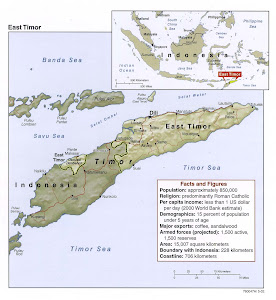The average East Timorese woman will give birth to 7-8 children in her lifetime. Today, 25-year-old Maria Gonsalves delivered her third.
The knock on my door at 4pm brings worrying news that one of the villagers is in labour, and needs help. Gathering my equipment, I scurry over to her house, 15 minutes away from ours. I find that most of the action is apparently over. The traditional birth attendant, an alarmingly unkempt forty-something with an impressive moustache, is nonchalantly squatting outside the wooden hut. Cigarette break.
Ushered into the cramped kitchen through the gaggle of Christmas-holiday-kids, it takes me a minute or so to make out the scene in the smoky glow of the lone candle. Maria, spent and leaning against the rice sack, on a blood-soaked bamboo mat on the gravel floor. A smallish baby with biggish eyes squirming in the blood and dirt between her legs. The birth attendant has already tied and cut the umbilical cord: black cotton thread and the well-worn razor.
The pot of rice gruel boiling on the wood stove, an arm's length away, looks almost done.
Baby and mum initially seem fine, but then I discover to my horror that she's still bleeding - half an hour after the delivery, the womb has not yet contracted, the afterbirth is still inside. We immmediately put the baby to suckle (hormones stimulated by breastfeeding help stop bleeding), I attempt to show the birth attendant how to manually contract the womb and extract the afterbirth. His skepticism is thinly veiled - what is this foreign chap with the pitiful moustache going to teach him about childbirth, that he hasn't already learnt from grandma?
It takes ten anxious minutes to stop the bleeding and remove the afterbirth.
East Timor has the highest rate of pregnancy-associated deaths in Asia. Women have many children - partly to compensate for the few that will inevitably die in childhood. Most of these deliveries take place in the home, with no trained midwife, under decidedly unsterile conditions. When complications such as prolonged labour, bleeding or infection occur out of reach of health services, they are invariably severe, often fatal.
When the dust settles, Maria and husband ask me to name their baby. I'm utterly dumbfounded. Thankfully, the village chief's wife comes to my aid.
Because she was born on Sunday, 'Domingu' in Tetum, we've named her Dominga.
[Picture: Dominga at 14 days]
.JPG)
-raj











.JPG)

.JPG)
